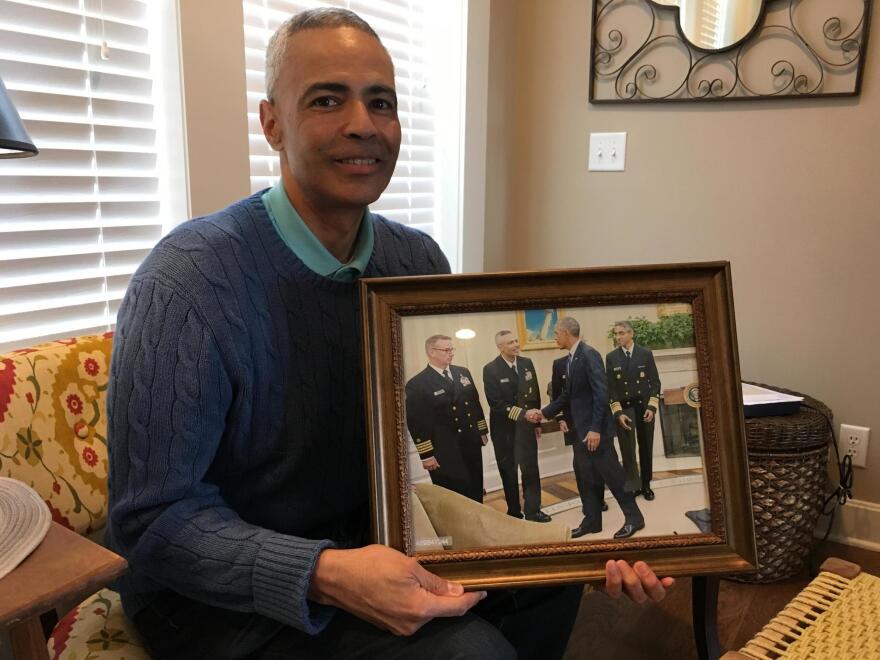Jose Belardo of Lansing, Kansas, spent most of his career in the U.S. Public Health Service. He worked on the frontlines of disasters in places like Haiti, Colombia, Nicaragua and the Dominican Republic. At home with his three kids and wife, Elaine, he'd always been unfailingly reliable, so when he forgot their wedding anniversary two years in a row, they both started to worry.
"We recognized something wasn't right and pretty much attributed it to being overworked and tired," Elaine says.
But the symptoms grew. Last year, when Jose was 50 years old, he got an evaluation at the Walter Reed Medical Center that included a battery of cognitive tests and an amyloid PET scan of his brain. The scan detects beta-amyloid plaques -- sticky clumps of protein fragments that tend particularly to build up in the brains of people with Alzheimer's disease (though some healthy elderly people have these plaques, too).
Jose says his diagnosis of early-onset Alzheimer's disease came as an inconvenient shock. Still, he and his wife believe it is better to have a diagnosis than not. Jose says he is determined to try to not let the shock of the diagnosis distract him from living a full life."

"I've got responsibilities, man. I can't go away," Jose says. "I've got kids. I've got graduations coming up. I've got all this stuff coming up. I'm not going to let Alzheimer's take that away from me. That's for sure."
The prospect of having Alzheimer's can be so scary, and the current treatment options so few, that many people dismiss memory problems or other symptoms rather than investigate them, say Alzheimer's specialists; it's estimated that as many as half of all cases aren't diagnosed.
But that may soon change. Researchers are making progress in measuring beta-amyloid and other Alzheimer's biomarkers in blood that might eventually be able to reliably, inexpensively and noninvasively identify the disease years before cognitive symptoms develop.
For now, PET scans for beta-amyloid still aren't widely available, and most other biomarker tests are still experimental. But John Morris, an Alzheimer's researcher and professor of neurology at Washington University in St. Louis, thinks these physiological measurements will signal a new chapter in Alzheimer's care.
The ultimate goal, Morris says, is to correctly diagnose and treat people "prior to the stage of dementia, prior to the stage where memory and thinking are affected, in an effort to delay the loss of memory and thinking ability or even prevent it."
In the meantime, he says, one reason to see a doctor at the first development of mild cognitive symptoms is because the symptoms might stem from something else that is quite treatable.
"For example, sometimes a low thyroid hormone level can produce a dementia-like state," he says, "and that can be easily treated with thyroid replacement therapy."
And even if the underlying problem is Alzheimer's, a recent study by the Alzheimer's Association suggests that accurately diagnosing the illness at the earlier stage of mild cognitive impairment — or possibly even before symptoms appear — could save $64,000 per patient in terms of health costs and long-term care costs over the course of their lifetime.
An earlier diagnosis also allows the patient to be more involved in planning for their own future and the family's. That can help reduce the emotional toll of the disease on everyone.

After Jose Belardo's illness was diagnosed, the family rushed to get his affairs in order. They got in touch with the Alzheimer's Association, which provided support groups and other help.
And before long, as Elaine explains, the shock started to wear off.
"What I would say is, after you get a diagnosis of something that is incurable and progressive and perhaps even aggressive: Pause. And breathe. And think about where the person is right at that moment. Because at that moment, Jose was not dying. And at this moment, Jose is not dying."
Researchers hope that by getting more Alzheimer's patients diagnosed early on, more people with the disease will, like Jose, be able to make the best of the health they have.
This story is part of NPR's reporting partnership with KCUR and Kaiser Health News. Alex Smith is a health reporter at KCUR in Kansas, City, Mo.
Copyright 2018 KCUR 89.3





